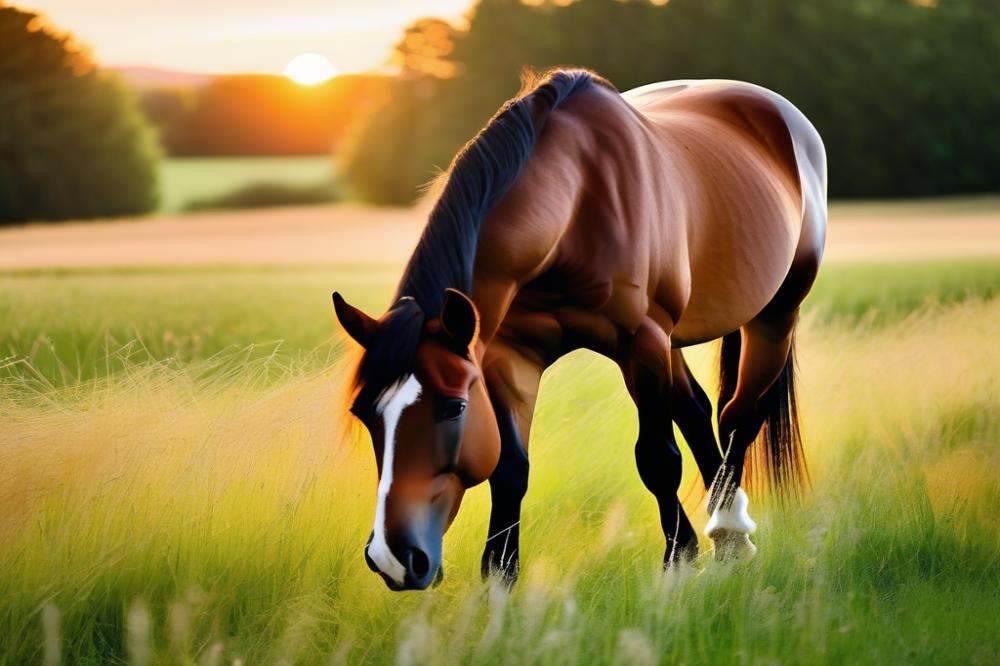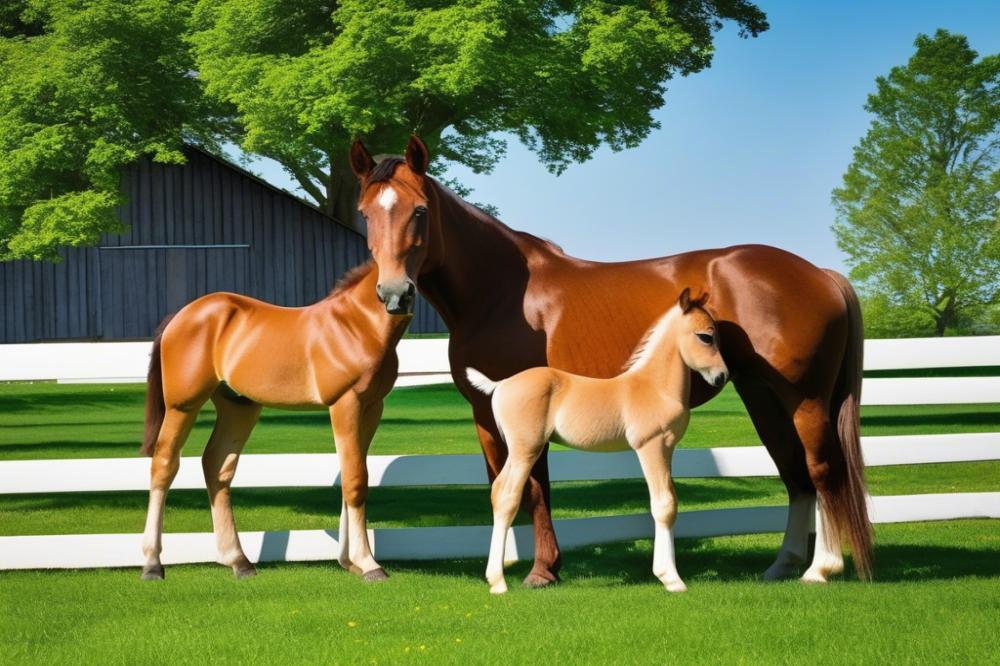Understanding mare infertility
Infertility in mares can pose significant challenges for horse breeders. It is a complex issue that directly affects the success of breeding programs. For many owners and breeders, the ability to produce healthy foals is crucial. Therefore, addressing these issues becomes essential in the realm of equine reproductive health.
There are several common causes of fertility problems in mares. Hormonal imbalances can disrupt the reproductive cycle, while structural abnormalities may prevent successful mating. Additionally, infections or environmental stressors can also lead to difficulties in conceiving. Each of these factors can have serious implications, not only for breeding outcomes but also for the overall well-being of the mare.
Understanding the signs of infertility is an essential first step. Early detection can help in taking the right measures. Reproductive failures can lead to emotional and financial strain. When a mare does not conceive, it is often more than just a breeding setback; it can impact the entire reproduction timeline for breeders.
In conclusion, it is important to recognize and address the factors that can lead to infertility. Doing so can promote better outcomes for both mare and owner. As we move forward, we’ll explore effective tips and solutions that can help manage these challenges and enhance breeding success.
Understanding mare infertility

Mare infertility refers to the inability of a female horse to conceive or produce a viable foal. This issue can stem from several factors, which might affect the reproductive process. Generally, it is essential to recognize the underlying causes to address the problem effectively.
Definition and Key Concepts
The essential aspect of the reproductive cycle includes estrus, ovulation, and gestation. Estrus is the period when a mare is in heat and receptive to breeding. Ovulation occurs when the ovary releases an egg. A successful pregnancy can only happen if all the components of this cycle function correctly. Problems along this journey often lead to infertility.
Factors Contributing to Infertility
Multiple factors influence the reproductive success of a mare. Hormonal imbalances can disrupt normal cycles. Age can also play a role; older mares may have more difficulty conceiving. Additionally, environmental factors, such as stress or nutrition, significantly impact fertility. Poor health or underlying infections might further complicate the situation.
Importance of a Thorough Reproductive Cycle Understanding
Grasping the complete reproductive cycle is vital for addressing infertility. Knowledge about timing for mating or insemination ensures higher chances of success. Observing behavioral signs helps in determining when a mare is in heat. Regular veterinary check-ups can assist in monitoring reproductive health and diagnosing any conditions that may lead to complications.
Ultimately, proactive measures can make a significant difference. Regular assessments of breeding soundness and health can inform adjustments in care or management. Maintaining a well-balanced diet and a stress-free environment further supports reproductive health in mares.
Fertility Evaluation

Understanding a mare’s fertility involves various methods and examinations. Each method provides insights into her reproductive health. A thorough fertility evaluation aims to identify any issues affecting her ability to conceive.
Methods for Assessing Mare Fertility
One common method involves observing the estrous cycle. This cycle can indicate a mare’s readiness to breed. Monitoring her behavior and physical signs is crucial. Another method is performing ultrasound examinations. Ultrasounds help visualize the reproductive organs. They can reveal abnormalities that may affect fertility.
Blood tests are also important in assessing reproductive health. Hormone levels can give a snapshot of how well the mare’s body is functioning. Evaluating these levels assists in diagnosing potential problems early on. In addition, a veterinarian may perform a reproductive tract examination. This exam checks for any structural issues or infections that may impede conception.
Key Tests and Examinations
Veterinarians often recommend several key tests to evaluate fertility. A common test is the cervical exam. This check can determine if there are any signs of inflammation or infection. Additionally, a vaginal speculum exam may be performed to inspect the inner reproductive structures. Swabbing samples from these areas can identify bacterial infections or other concerns.
Another key examination includes checking the ovaries and follicles. A healthy ovary typically contains developing follicles. Ultrasound can show if there are any cysts or irregularities present. Finally, endometrial biopsies may be necessary in some cases. This procedure allows for a close look at the uterine lining. It can help diagnose issues like endometritis, which can hinder pregnancy.
Role of Reproductive Veterinary Care in fertility evaluation
Reproductive veterinarians play a pivotal role in fertility assessments. They have specialized knowledge in equine reproductive health. Working with an experienced vet can lead to more accurate evaluations. They help identify potential problems and suggest treatment options. Regular check-ups with a vet can lead to better outcomes for both the mare and her owner.
Proper veterinary care includes creating a breeding plan tailored to the mare. This plan considers her age, health status, and any previous fertility issues. Following a vet’s recommendations helps optimize her chances of conceiving. Overall, a proactive approach to reproductive health is necessary for a successful breeding program.
breeding management Strategies

breeding horses involves careful planning and execution. To achieve successful outcomes, specific strategies are essential. Starting with best practices can make a significant difference. This includes scheduling regular veterinary visits and maintaining a healthy diet for the mare. Additionally, providing environmental stability is necessary. Horses feel more comfortable in familiar surroundings.
Monitoring the reproductive cycle is equally important. Estrus, or the heat cycle, is key to understanding the ideal breeding times. Recognizing the signs of heat can help determine when to breed. This can include behaviors like increased urination and standing heat. Timing is critical for successful insemination.
Integrating ultrasound monitoring is a modern approach that offers numerous advantages. By using ultrasound technology, veterinarians can assess follicle development. This practice allows for precise timing of ovulation. Track the changes in the mare’s reproductive system, such as follicle size and uterine response. Such detailed monitoring will improve the chances of conception.
Combining these elements—best practices, cycle monitoring, and ultrasound—leads to better management of fertility issues. Regular check-ups should not be neglected. Consistency is key to achieving optimal results in breeding programs. Invest time in learning about the reproductive physiology of mares. This knowledge is valuable when making informed decisions.
Hormonal Treatments and Interventions
Overview of hormonal treatments and their benefits
Hormonal treatments play a significant role in managing infertility issues in mares. These therapies help regulate reproductive cycles and enhance fertility. Many options are available, including progesterone, estrogen, and prostaglandin. Each hormone serves a different purpose. For example, progesterone is vital for maintaining pregnancy. It can also help prepare the uterine lining for embryo implantation. Estrogen helps stimulate follicle development and ovulation. Prostaglandin, on the other hand, is useful for controlling the timing of estrus cycles.
These treatments can increase the chances of successful breeding. They support mares with irregular cycles or hormonal imbalances. When applied correctly, hormones can lead to healthier pregnancies. Ultimately, effective hormonal management promotes better outcomes for both the mare and the foal.
When to consider hormonal therapy
Deciding when to use hormonal therapy depends on the specific situation. If a mare shows abnormal estrus cycles, it may be time for intervention. Signs such as prolonged periods of heat or missed cycles can indicate hormonal issues. Older mares may also benefit from treatments to boost fertility.
Veterinarians often recommend testing hormone levels first. This step helps identify imbalances and informs treatment plans. If conventional breeding methods do not yield results, exploring hormonal therapy may be necessary. Sometimes, immediate action is essential. Quick responses can lead to better reproductive results.
Monitoring responses to treatments
Monitoring is a crucial part of any hormonal treatment plan. Keeping track of the mare’s response allows for adjustments in therapy if needed. Regular veterinary check-ups help assess progress. Blood tests can provide insight into hormonal levels. Tracking heat cycles and behavior is also essential.
Owners should document any changes they notice. Changes might include variations in the mare’s temperament or physical condition. All these observations will assist the veterinarian in tailoring the treatment. Effective communication between the owner and the vet is vital. A combined approach can lead to successful outcomes in managing mare infertility.
Nutritional Support for Mare Health
Nutritional requirements for optimal fertility
A mare’s diet directly influences her reproductive health. Nutritional needs change depending on age, weight, and health condition. A balanced diet includes hay, grains, and fresh forage. It is also essential to provide clean water daily. Key nutrients, such as protein, minerals, and vitamins, play a vital role in supporting fertility. Protein is necessary for tissue growth and hormone production. Vitamins like E and A are critical for ovulation and maintaining pregnancy. Minerals, including calcium and phosphorus, help maintain overall body functions and promote strong foal development.
Role of diet in reproductive health
Every component of a mare’s diet can impact her ability to conceive. A well-rounded diet improves the chances of successful mating. Overweight or underweight mares may struggle with fertility. It is crucial to monitor body condition scores regularly. Maintaining proper weight helps regulate hormone levels, which are essential for reproduction. Additionally, stress can arise from poor nutrition, affecting a mare’s reproductive cycle. Healthy mares are more likely to display regular heat cycles, thus improving chances for breeding.
Supplements that can enhance fertility
In some cases, dietary supplements become necessary to maximize reproductive potential. Omega-3 fatty acids support a healthy reproductive environment. These can come from flaxseed or fish oil. Folic acid is another important supplement, especially during early pregnancy. It helps prevent fetal development issues. Antioxidants, such as selenium and vitamin E, can also benefit mares by enhancing immune function and reducing oxidative stress. Before adding any supplements, consulting a veterinarian is wise. They can recommend specific products to meet individual needs and goals. Customizing a mare’s diet with these inputs can lead to improved fertility outcomes.
Stallion Selection and Seasonality Effects
Factors to Consider When Selecting a Stallion
Choosing the right stallion is crucial for successful breeding. Look for stallions with a proven reproductive record. Health is a top priority; make sure the stallion has no disease history. Bloodlines should also be evaluated for desired traits. Consider the stallion’s temperament, as a calm nature can ease the breeding process. Genetic diversity plays a role too; it helps avoid inbreeding. Assess the stallion’s performance records in similar mares to predict outcomes. A thorough examination of all these elements can lead to better fertility rates.
Impact of Seasonality on Mare Fertility
Seasonality significantly affects how well mares conceive. Mares have specific breeding seasons influenced by daylight hours. Typically, they are cyclic from spring to summer. Hormonal changes in mares lead to their reproductive readiness during these months. Off-season breeding can lead to lower success rates. Mare fertility may decrease in winter when daylight is shorter. Understanding these cycles is essential for effective planning. By observing the mare’s body language and behavioral changes, breeders can identify optimal breeding times.
Synchronizing Breeding Plans with Seasonal Cycles
Planning breeds should align with the natural cycles of the season. Timing can enhance the chances of successful breedings. Utilize artificial light to stimulate estrus during off seasons. This practice can improve the overall fertility rate in mares. After synchronizing, keep an eye on the mare’s estrus patterns. Regular veterinary check-ups can help monitor ovulation. Using ultrasound technology can provide valuable insight into the mare’s reproductive status. Such strategies adapt breeding plans to fit within the seasonal framework. Following these methods can lead to better outcomes in reproductive success.
Mare Health Assessment
Comprehensive health assessments for breeding mares
Regular health evaluations are vital for breeding mares. A full assessment helps identify any issues that could impact fertility. This includes checking the mare’s body condition, dental health, and overall wellness. A balanced diet and proper exercise are also essential. Thorough examinations should involve checking the reproductive organs. Ensuring that everything is working correctly helps prevent infertility problems. Blood tests can reveal hormone levels or infections. Routine checks by a veterinarian can make a significant difference in outcomes.
Regular veterinary check-ups and their importance
Veterinary check-ups should occur at least once a year. These visits allow for vaccinations, deworming, and general health monitoring. Attending to these aspects can prevent disease that may hinder breeding. A vet can also guide you on optimal breeding times. Knowledge about these windows is essential for successful mating. Keeping consistent records during these visits helps track health changes over time. Over the years, this data proves useful for future breeding decisions.
Addressing underlying health issues
Many factors might contribute to infertility in mares. Some may have underlying health problems that go unnoticed. Regular assessments can help to uncover these issues. If a mare has chronic pain or stress, it may affect her ability to conceive. Treating such conditions often requires a tailored approach. An accurate diagnosis is critical. Collaborating with a veterinarian can pave the way for a clearer understanding. After identifying these health concerns, appropriate treatments can be started. Merely addressing symptoms without understanding the cause will not yield effective results. Early intervention frequently leads to better outcomes in breeding cycles.
Final Thoughts on Managing Mare Infertility
Throughout this article, we have discussed various aspects of mare infertility. Key points include understanding the importance of regular fertility evaluations, recognizing signs of reproductive issues, and the role of proper breeding management. Each facet plays a vital role in enhancing reproductive success.
Being proactive can significantly impact a mare’s ability to conceive. Implementing a routine health check and monitoring reproductive cycles can lead to early detection of problems. This allows for timely interventions, which can improve overall outcomes. Remember, an ounce of prevention is worth a pound of cure.
Consulting with veterinarians and specialists is essential for personalized care. These professionals can offer tailored advice and treatments suited to each individual mare’s needs. They possess crucial knowledge of the latest research and techniques that can assist in managing reproductive challenges.
Embrace the responsibility that comes with horse ownership. Infertility can discourage many, but with attentive care and support from experts, there is hope. The journey may be difficult, but it is not impossible. Your efforts can lead to successful breeding experiences in the future.
In conclusion, focus on proactive measures and stay informed. Your mare’s reproductive health is an important part of her overall well-being. With dedication and the right guidance, enjoyable results can be achieved.



